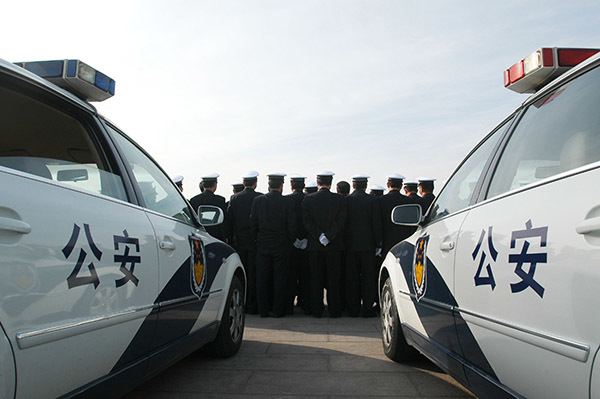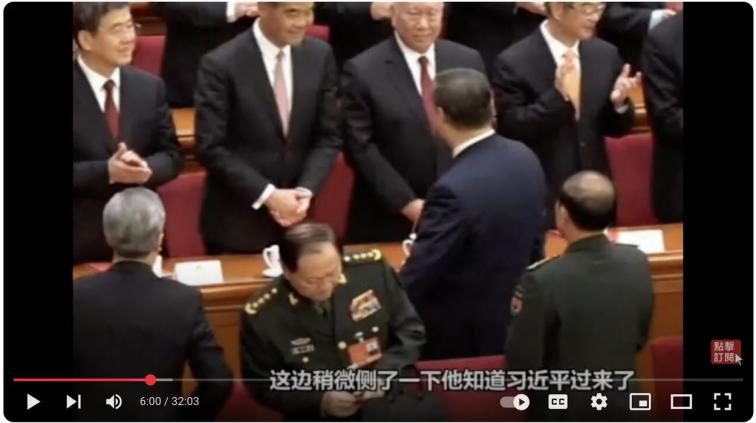Illustration: CCP Police Vehicle (China Photos/Getty Images)
[People News] On June 9, just before the sensitive anniversary of June 10, China’s top anti-corruption agency, the Central Commission for Discipline Inspection (CCDI), prominently announced on its homepage that Gao Yichen, former Deputy Director of the Central Leading Group Office for Preventing and Handling Cult Issues (commonly known as the “610 Office”), is under investigation for serious violations of discipline and law. Though only a vice-ministerial level official, the timing, figure involved, and political background have drawn considerable attention, especially amid intensifying rumours that Xi Jinping is stepping down and a new central leadership is taking shape.
Gao Yichen Investigated on Eve of 610 Anniversary
The timing is symbolically charged: exactly 26 years ago, on June 10, former CCP General Secretary Jiang Zemin established the 610 Office—an extralegal Party organ dedicated to persecuting Falun Gong practitioners—by coercing the Politburo Standing Committee into submission. Now, 26 years later, with persistent rumours of Xi Jinping's ousting growing louder, Gao Yichen is suddenly under investigation. Observers suggest this move may indicate that the CCP is preparing to abandon or scapegoat those responsible for initiating what they call the root of many of China's current problems, namely, the persecution of Falun Gong. Some speculate this may be the beginning of the end for this unprecedented human rights catastrophe.
Public records show that 75-year-old Gao Yichen held multiple titles: Vice Minister of State Security (with vice-chief police inspector rank), and Deputy Secretary-General of the Central Political and Legal Affairs Commission (PLAC). Since 2005, he has served as Executive Deputy Director of the 610 Office. He later concurrently held positions in the Central Committee's Stability Maintenance Office. He retired in March 2017. The fact that the authorities chose to publicise his downfall on the eve of the 610 Office’s founding anniversary—and emphasised his former role—suggests a targeted retrospective reckoning.
Zooming out, this announcement coincides with rumours that Xi Jinping has been sidelined and the CCP is now being led by Party elders. Some claim that Wang Yang, former Politburo Standing Committee member and Vice Premier, has temporarily assumed Xi’s responsibilities. If true, Gao Yichen’s fall may be tied to these leadership shifts. Could the "new central leadership" be unwilling to shoulder the crimes committed against Falun Gong since Jiang Zemin’s time? That is one reason this seemingly minor official’s investigation is attracting outsized attention.
610 Office: China’s Gestapo and Its Origins
Before analysing further, we must address a longstanding question: why does the Chinese Communist Party (CCP) harbour such intense hatred toward Falun Gong, a spiritual practice that never participated in politics? And what is Falun Gong?
Falun Gong was introduced in mainland China in 1992. Due to its remarkable effects on physical health and moral improvement, it quickly became popular. By 1999, CCP-controlled media reported 70 million to 100 million practitioners. But on July 22, 1999, overnight, Jiang Zemin declared: “Falun Gong is competing with the Party for the hearts and minds of the people. It must be banned.” The CCP, which holds atheism as its state ideology, views belief in divine principles as a threat: “If people all believe in gods, the Communist Party is finished.”
Thus, the crackdown began not because of what Falun Gong did, but because it was too numerous. Jiang Zemin, who rose to power by supporting the 1989 Tiananmen Square massacre, constantly feared the illegitimacy of his rule. Convinced that even small disturbances might cost him his power, he became pathologically jealous and paranoid. As a result, he adopted the mentality of “Better to wrongly kill a thousand than let one go,” and weaponised the CCP’s vast machinery, honed over decades of political persecution against Falun Gong. The 610 Office became the top extralegal body behind the persecution, with unchecked Gestapo-like powers, yet was deliberately obscured from public view.
Although Xi Jinping officially abolished the “reeducation through labour” system in late 2013, persecution of Falun Gong intensified. Secret “black jails,” longer prison terms, and harsher “transformation” torture tactics proliferated. In a political and legal affairs meeting held just before the 20th CCP Congress in 2022, Xi reportedly launched a new wave of global suppression of Falun Gong, targeting overseas communities.
Retribution Follows Persecution
Today, the CCP continues to mobilise all national resources to persecute Falun Gong in increasingly sophisticated ways. It promotes disinformation, such as claiming Falun Gong prohibits medical treatment, promotes starvation (bigu fasting), or encourages extremism. Many practitioners are secretly detained without even their families knowing, paving the way for forced organ harvesting and gruesome experiments that shock the world but draw numb indifference from many.
Although the central 610 Office was officially dissolved in March 2018 and absorbed into the PLAC and the Ministry of Public Security, many top officials were imprisoned under anti-corruption charges. For instance, Former 610 Director Zhou Yongkang received a life sentence. Among 13 former deputy heads, Li Dongsheng, Zhang Yue, Fu Zhenghua, and Zhou Benshun were investigated and sentenced. Of the 6 directors who directly orchestrated the persecution, 2 were investigated: Li Dongsheng and Fu Zhenghua. Among 9 deputy directors, 4 were punished: Li Dongsheng, Gao Yichen, Sun Lijun, and Peng Bo.
Against this backdrop, the high-profile takedown of Gao Yichen, timed just before the 610 anniversary and amid growing rumours of Xi’s fall, appears far from coincidental.
It’s worth noting: On March 13, 2021, the CCDI announced the investigation of 610 Office deputy director Peng Bo. The announcement followed a similar format but attracted little attention. Notably, the media downplayed his 610 affiliation, suggesting the move was more symbolic than serious. This contrast highlights how Gao Yichen’s case is different—and potentially politically significant.
Commentator Jin Taopai'an speculates that the CCP’s new leadership may be vacillating on the Falun Gong issue, or perhaps laying the groundwork for a policy shift. Meanwhile, political analyst Li Yanming raises the possibility that Gao’s investigation is linked to the U.S. House of Representatives passing the Falun Gong Protection Act just one month prior.
Whatever the case, the persecution of Falun Gong has already resulted in a humanitarian disaster. It has fueled China’s moral decay, social disintegration, economic collapse, and political instability. Today, signs of abnormality abound in Zhongnanhai. The tides of karmic retribution are rising. The heavenly mandate against the CCP is becoming increasingly apparent.
The CCP does not represent China, nor its people. It merely hijacked China and its government functions for its own ends. Gao Yichen’s downfall is no accident. China is now at a pivotal crossroads.
Let us hope that Party officials and ordinary people alike do not allow themselves to bear the cost of the CCP’s historical crimes. In this moment of historic transformation, Zhongnanhai’s top brass face a life-and-death decision that may determine their fate.
(First published by People News)








News magazine bootstrap themes!
I like this themes, fast loading and look profesional
Thank you Carlos!
You're welcome!
Please support me with give positive rating!
Yes Sure!